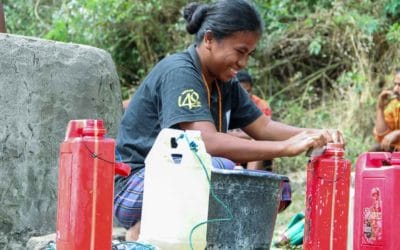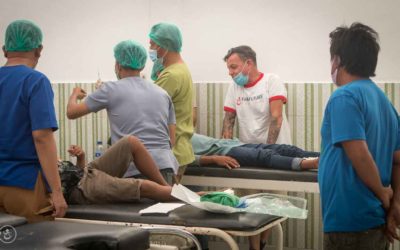The truck of Life is so important… It allows us to go where almost no one ever goes. To meet people who have unexpected problems. To provide medical care, to take children or even a doctor or dentist to the nearest town. Truck of Life allows us to bring equipment, food, and drinking water where no one goes while ensuring the safety of our volunteers and specialized collaborators. Indeed, hundreds of thousands of people live in the most inaccessible territories who do not have access to the most basic needs to ensure a healthy life: No access to medical care, drinking water, or a light source for children to read or study.
After years of walking to find dirty water, villages like Laindatang, Hambarita or Mbinudita can now access clean water from community reservoirs they built themselves. Clean water reduces diarrhea, skin infections, and fear. This is a true reflection of dignity in daily life.
Donate
Support Care
Programs
All projects
Quick News
Field updates
Stories
Field stories
Vital Health Care Access for Ultra-Rural Communities
Fair Future Foundation is committed to ensuring vital health care access in ultra-rural communities. Our programs focus on preventing and treating diseases like malaria, dysentery, and polio, which are the leading causes of infant mortality. By integrating health education, primary medical care, and access to clean water, we work to improve the health and well-being of women, children, and families in East Sumba and beyond.
The Healthcare Access category of Fair Future Foundation highlights the challenges and solutions for improving healthcare in ultra-rural Indonesia. These stories show how we bring medical care to those who need it most, overcoming barriers like distance, infrastructure, and cost. Through mobile clinics, training health agents, and innovative approaches, we ensure that every family has the chance to receive the care and support they deserve, no matter how remote.
Access to basic healthcare can mean the difference between life and death
Shortage of clean, safe drinking water
All these people, we meet every day. When we ask them what their biggest dream is, all without exception answer us this: To have clean water, some not dangerous for their health and that of children, and pregnant women. To have access to it here, close to home. To be able to water and cultivate a garden, eat better, shower, and wash. But above all to be able to drink more, cook more. The Fair Future and Kawan Baik foundations within the framework of the Water Connections project, strive by all means to fulfil their dreams. Their lives, their health and their future are at stake. Water is the source of life, of all life!
Days of medical care in rural areas
Discover the different contexts and situations in which Fair Future teams intervene to provide care, including crisis and natural disaster situations, and how and why we adapt our activities to each. Days of care like the one we present to you below we do dozens of them a year and they are adapted to people from rural areas, who for the most part have never seen a doctor before us.





